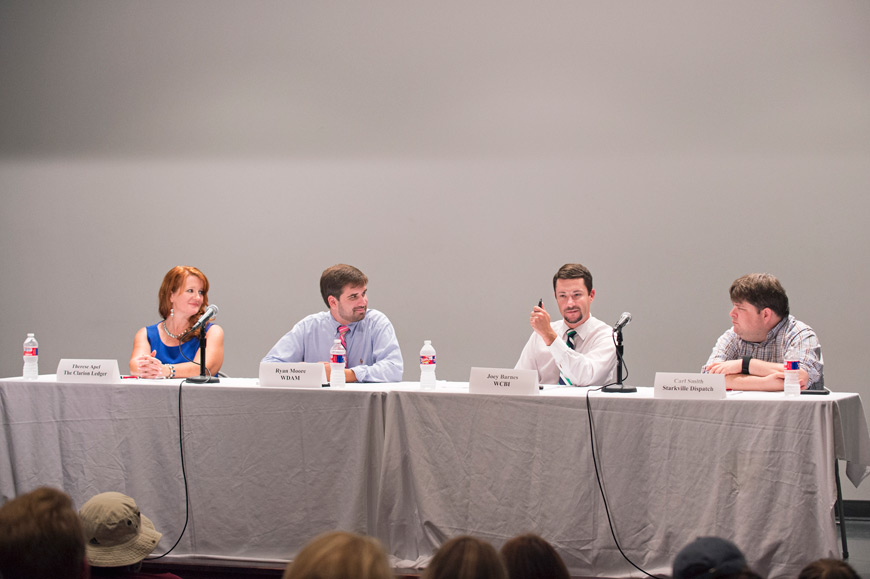Panel of journalists: ‘Tell the truth’
Contact: Zack Plair

STARKVILLE, Miss.—No matter how technology changes news media delivery methods, a panel of professionals speaking at Mississippi State University on Wednesday [Oct. 7] said the first rule of reporting should never change: Tell the truth.
The panel, which consisted of print reporters Therese Apel of the Clarion-Ledger in Jackson and Carl Smith of the Starkville Dispatch; and television broadcasters Joey Barnes with WCBI in Columbus and Ryan Moore of Hattiesburg-based WDAM, spoke to students as part of News Engagement Day on campus. Sponsored by MSU’s communication department, the event coincided with the Association for Education in Journalism and Mass Communication’s initiative to engage with news media and recognize why news matters.
Panelists discussed the increased prominence of social media in reporting, as well as deadlines, ethics and the entertainment value of news. While panelists admitted technology and increasingly competitive media markets put unprecedented pressure on reporters to break stories, they all agreed it is still far more important to be right than to be first.
“It’s good to be first, but people will only remember if you are accurate,” said Barnes, managing editor, news editor and anchor at WCBI.
Apel, the Clarion-Ledger’s breaking news reporter, also spoke to the benefits and challenges “citizen journalists” create when they take to social media. Speaking to her experience covering September’s shooting at Delta State University in Cleveland, where one professor killed another and later took his own life, Apel said wading through tweets about the scene, verifying which were true and which were rumors, added an extra layer to her already hectic task on scene.
“What you have are all these people tweeting all the things they’ve seen,” she said. “It becomes a guessing game (as to what to retweet and share).”
Smith, the Starkville bureau reporter for the Columbus-based Commercial Dispatch, agreed with Apel. Also a frequent Twitter user in reporting, Smith said capitalizing on citizen journalism means tirelessly verifying information and building a trustworthy source base.
“It really gets us back to the basics of what we do,” Smith said.
Both Apel and Moore, the crime reporter for WDAM, spoke to multi-platform reporting as a means to engage different types of consumers with a media product. For example, Moore addressed how broadcast journalists were increasingly writing newspaper-style stories for the Web to complement their traditional video packages that air on TV. Conversely, Apel noted the Clarion-Ledger’s use of video on the Web to complement their printed and online stories.
Overall, Moore characterized a journalist’s day at the office in the same manner most characterize the trade itself.
“It’s always something different,” he said. “If you like something that’s ever-changing that you have to adapt to, this is it.”
MSU is Mississippi’s leading university, available online at www.msstate.edu.